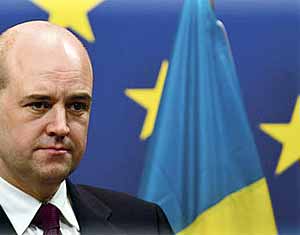13.07.2009
July 08, 2009 (the date of publication in Russian)
Ruslan Kostyuk
SWEDEN IS GOING TO SACRIFICE EASTERN PARTNERSHIP
The financial problems of Baltic States have discouraged Stockholm from assistance to "new democracies"
 The Czech chairmanship in the European Union, marked with a row of scandals without any tangible contribution to the European process (not speaking of breakthroughs), has silently expired. On July 1, these duties were conveyed to Sweden. On the eve of the shift, Swedish Prime Minister Fredrik Reinfeldt convened a press conference in order to present the major points of the agenda of the next six-month period. He claimed that the principal priorities of the Swedish chairmanship will be the financial crisis and the threat of global warming.
The Czech chairmanship in the European Union, marked with a row of scandals without any tangible contribution to the European process (not speaking of breakthroughs), has silently expired. On July 1, these duties were conveyed to Sweden. On the eve of the shift, Swedish Prime Minister Fredrik Reinfeldt convened a press conference in order to present the major points of the agenda of the next six-month period. He claimed that the principal priorities of the Swedish chairmanship will be the financial crisis and the threat of global warming.
The first of the two priorities has acquired significance after several top Swedish banks encountered problems due to insolvency of their borrowers in the Baltic States, particularly in Latvia. For this reason, as well as due to the decline of demand for Swedish industrial production, Stockholm had to introduce a number of austerity measures. However, social expenses are slashed with caution, as the strength of the national unionist movement and the Social Democratic Party (which dominated in the elections to the European Parliament in Sweden) permanently reminds the rightist- centrist cabinet that a significant part of the citizens is unlikely to countenance with loss of social achievements.
Mr. Reinfeldt also claimed that during its term of EU chairmanship, Sweden will concentrate on establishing a special "communitarian institute" supposed to guarantee financial stability in Europe. Efficient measures this new body is expected to implement, according to the PM, "must win confidence from financial markets".
By today, the Swedish Kingdom has not yet joined the Economic and Monetary Union. At the same time, major government parties insist on Sweden's entry in the Eurozone. In a recent joint statement, the member parties of the ruling coalition emphasized that in case of a new success (which, however, is not much probable), they will repeatedly launch a national referendum on this issue. The number of supporters and opponents of replacing the Swedish krona by the all-European currency is almost equal, comprising 45-46% of voters.
During its term, Sweden is also going to elaborate a new strategy of employment and growth. The Government is convinced that despite adherence to rightist policies, European countries should spend a goodly proportion of their budgets for social purposes and maintain a "general and universal" welfare system, including expenses for unemployment benefits.
The subject of climate change has long served as a priority of Scandinavian (both leftist and conservative) governments. Along with other countries of Northern Europe, Sweden was a strong supporter of subscription and implementation of the Kyoto Protocol. In the EU framework, Sweden is in the forefront of environmentalism. Even some rightist politicians advocate gradual curtailment of nuclear energy. Sweden recycles over 60% of industrial and urban waste. State expenses for environmental purposes exceed 58mln euro per year. Mr. Reinfeldt urged other European countries to work as hard as possible in order to "attain a qualitative turning point in the global struggle against climate change".
Most observers admit that the Swedish chairmanship is unlikely to perform as ambitiously as the French in the second half of 2008, but at the same time, it is expected to be more coherent and vigorous than the Czech predecessor. It is noteworthy that opposite to the Czechs, the Swedish authorities are today skeptical towards the Eastern Partnership Program (created in order to provide EU assistance to Ukraine, Moldova, Belarus, Georgia, Armenia, and Azerbaijan), though Sweden had been one of the authors of its design. At the same press conference, Mr. Reinfeldt shocked Brussels with the assumption that the Eastern Partnership may be curtailed, due to rather economic than political reasons: the crisis forces Europeans to economize instead of engaging in charity programs.
Number of shows: 2276
 ENG
ENG 

 ENG
ENG 
